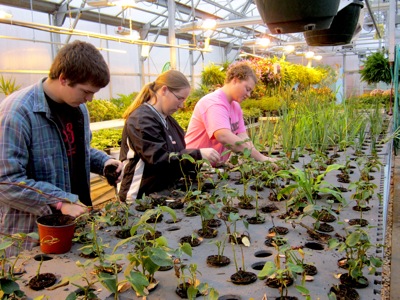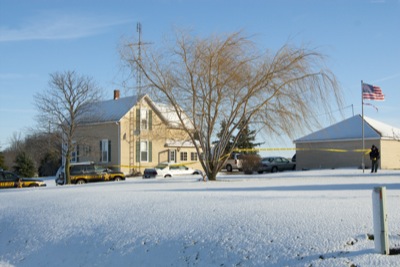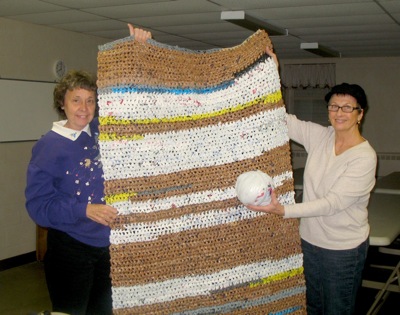Wednesday, November 30th, 2011
University, local youths together study Grand Lake
By Nancy Allen

Submitted Photo
Blake Schmitt, Melissa Kahlig and Taylor Guggenbiller, seniors in the Tri Star horticulture program in Coldwater, tend to wetland plants in the greenhouse. The students will be working with the University of Findlay to study the plants and Grand Lake water quality issues.
GRAND LAKE - The University of Findlay's biology department received a $4,978 Ohio EPA mini grant to fund educational experience related to Grand Lake.
University officials will learn alongside high school students studying floating wetland plants at the Tri Star Career Compact greenhouse in Coldwater, while younger students will participate in water quality programs.
"What we envision working with Findlay is being able to share testing equipment," Tri Star horticulture instructor Denny Riethman said. "Ideally, we'd like to borrow plant tissue kits that determine the amount of nutrients the plants uptake."
The floating wetland plants, secured in interconnected mats, have been placed in the lake for two years to help lower levels of phosphorous, the main nutrient feeding toxic algae blooms. The plants are removed before the weather turns cold and adopted by different groups that care for them over the winter.
Tri Star students will test the effect of different types of water quality on the plants' growth and how well they absorb nutrients. This is the second year students have studied the plants. Students this year will share their findings with the university.
The grant will pay for plant material, water sampling supplies, lab equipment and transportation for Water Quality Days around the lake, the EPA says. The project will bring together Findlay undergraduate students with students from Mercer, Auglaize and Hancock counties. The college students are studying ecology, botany, microbiology and environmental sampling and statistics.
University staff and students visited the lake Nov. 1 to gather baseline water quality data and meet Riethman and his students, said Matt Hoostall, University of Findlay biology instructor. The university applied for the grant at the suggestion of one of its employees whose parents live in Celina, he said.
Hoostall said university staff and students also will interact with elementary students at water quality field days arranged by Walker. Youths will identify native and invasive plants, remove invasive plants, replant the lake's shoreline with native plant species and monitor bacteria and algal counts.
Hoostall said he believes local youths and university officials will learn from each other during the experience.
Riethman said he hopes the experience will expose students to different career paths.
"Studying the environment is something there is going to continue to be many opportunities in," Riethman said. "Just look at Grand Lake and other lakes around Ohio ... those lakes are having problems and they need people to test them and find out how we can use natural plants to clean up the mess we have."
The 13,500-acre Grand Lake has suffered toxic algae blooms the last two summers resulting in varying degrees of state-issued water quality advisories. The blooms devastated tourism and hurt lake-related businesses.
Ten projects throughout Ohio received environmental education mini grants totaling $42,813. The Ohio Environmental Education Fund distributes about $1 million each year for environmental education projects for students in kindergarten through the college level, the general public and the regulated community. General grants are awarded for projects that last up to 30 months and cost up to $50,000. Mini-grants are awarded for projects that last up to 12 months and cost between $500 and $5,000.






















